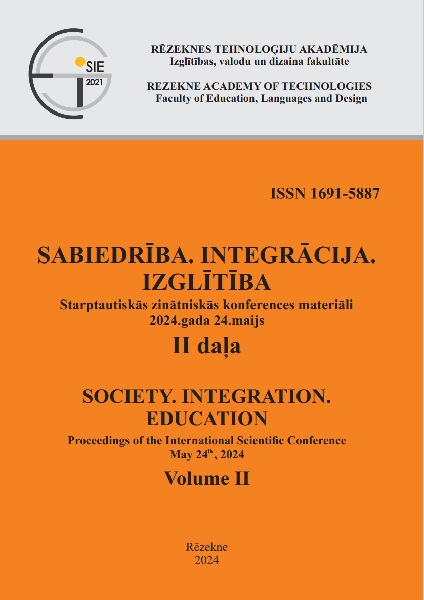ATTITUDES OF PARENTS AND TEACHERS TOWARDS MATHEMATICS EDUCATION IN THE CONTEXT OF STEAM EDUCATION
DOI:
https://doi.org/10.17770/sie2024vol2.7822Keywords:
child, mathematical skills, parent, pre-school age, STEAM, teacherAbstract
The pre-school period is valuable in itself. It is at this age that the child's most important personality traits, his or her perception, thinking, communication, etc., develop. STEAM goes hand in hand with the development of 21st century skills and should be included as early as possible in the curriculum. Children's early experiences with science, technology, engineering and mathematics and the arts influence their future success in these areas. When teachers give children early opportunities to learn maths and science in an interactive environment that builds communication and collaboration skills, children are more confident and competent in these subjects. This not only makes higher education more accessible to children but also contributes to a well-prepared society. Survey of 116 teachers and 104 parents identified that parents of pre-school children are more accurate in identifying the disciplines that STEAM education integrates, they perceive that the teacher's background in mathematics and science influences children's mathematical and science education, and that young children can apply early mathematical concepts. Parents identified advantages and barriers to the successful implementation of STEAM in pre-school education.
References
Asghar, A., Ellington, R., Rice, E., Johnson, F. ir Prime, G. M. (2012). Supporting STEM Education in Secondary Science Contexts. Interdisciplinary Journal of Problem-Based Learning, 6 (2). Retrieved from: https://docs.lib.purdue.edu/ijpbl/vol6/iss2/4/
Aubrey, C. (2006). Early mathematics development and later achievement: Further evidence. Mathematics Education Research Journal, 2006, Vol. 18, No. 1, 27– 46. Retrieved from: https://www.smcsd.org/documents/About-Us/Desegregation/Unification/Document-Archives/Academic%20Studies/Pre-K/Early_math_and_later_school_success.pdf
Burskaitiene, R. (2019). STEAM ugdymas: patarimai ir idėjos, kaip ugdyti darželinuką. Kaunas: Šviesa.
Chatzopoulos, A., Papoutsidakis, M., Kalogiannakis, M. and Psycharis, S. (2019). Action Research Implementation in Developing an Open Source and Low Cost Robotic Platform for STEM Education. International Journal of Computer Applications, 178 (24), 33-46. Retrieved from: https://www.ijcaonline.org/archives/volume178/number24/chatzopoulos-2019-ijca-919039.pdf
Chen, K., Chen, C. (2021). Effects of STEM Inquiry Method on Learning Attitude and Creativity. EURASIA Journal of Mathematics, Science and Technology Education, 17(11), em2031. doi:https://doi.org/10.29333/ejmste/11254
Chiu, A., M.S., C. Aaron, Price, Ph.D., Ovrahim, E., M. Ed. (2015). Supporting elementary and middle school stem education at the whole-school level: a review of the literature. Museum of Science, and Industry. NARST 2015 Annual Conference, Retrieved from: https://www.msichicago.org/fileadmin/assets/teachers/science_leadership_initiative/SLI_Lit_Review.pdf
Ejiwale, J. (2013). Barriers to successful implementation of STEM education. Journal of Education and Learning, Vol.7 (2) pp. 63-74. Retrieved from: https://media.neliti.com/media/publications/71913-EN-barriers-to-successful-implementation-of.pdf
Hassan, M. N., Abdullah, A. H., Ismail, N., Suhud, S. N. A. ir Hamzah, M. H. (2019). Mathematics Curriculum Framework for Early Childhood Education Based on Science, Technology, Engineering and Mathematics (STEM). International electronic journal of mathematics education. vol. 14, no. 1, 15-31.
Heinecke, L. L. (2019). STEAM eksperimentai. Kaunas: Šviesa
Howard-Brown, B., Martinez, D., Times, C. (2012). Engaging Diverse Learners through the Provision of STEM Education Opportunities. Briefing Paper. Southeast Comprehensive Center. Retrieved from: https://eric.ed.gov/?id=ED573497
Kennedy, T. J., Odell, M. R. L. (2014). Engaging Students in STEM Education. Science Education International, v25 n3 p246-258 2014. Retrieved from: https://eric.ed.gov/?id=EJ1044508
Kermani, H., Aldemir, J., (2015). Preparing children for success: integrating science, math, and technology in early childhood classroom. Early Child Development and Care 185(9):1-24. Retrieved from: https://www.researchgate.net/publication/273486367_Preparing_children_for_success_integrating_science_math_and_technology_in_early_childhood_classroom
Laboy-Rush, D. (2011). Integrated STEM Education through Project-Based Learning. Learning.com.
Lietuvos Respublikos švietimo, mokslo ir sporto ministerija (2023). 2023–2027 metų matematikos mokymo ir mokymosi gerinimo planas// Plan for Improving Mathematics Teaching and Learning 2023-2027. Retrieved from https://smsm.lrv.lt/lt/veiklos-sritys-1/smm-svietimas/2023-2027-metu-matematikos-mokymo-ir-mokymosi-gerinimo-planas/
Mervis, J. (2011). Is There a Special Formula for Successful SCIENCE, TECHNOLOGY, ENGINEERING AND MATHEMATICS (STEM) Schools? Science Insider. Retrieved from: http://news.sciencemag.org/scienceinsider/2011/05/-is-there-aspecial-formula-for-.html
Monkeviciene, O., Autukeviciene, B., Kaminskiene, L., Rutkiene, A., Tandzegolskiene, I., Skeryte – Kazlauskiene, M., Monkevicius, J., Stonkuviene, G. and Vildziuniene, E. (2018). Tyrimo „Pažangi pedagoginė praktika ir pedagoginės inovacijos Lietuvos vaikų darželiuose” ataskaita. Retrieved from: https://www.ikimokyklinis.lt/uploads/files/dir1306/dir65/dir3/3_0.php
Ng, A., Kewalramani, S., Kidman, G. (2022). Integrating and navigating STEAM (inSTEAM) in early childhood education: An integrative review and in STEAM conceptual framework. EURASIA Journal of Mathematics, Science and Technology Education, 2022, 18(7), em2133. Retrieved from: https://www.ejmste.com/article/integrating-and-navigating-steam-insteam-in-early-childhood-education-an-integrative-review-and-12174
Smith, L. L., Samarakoon D. (2017). Teaching Kindergarten Students about the Water Cycle through Arts and Invention. Journal of STEM Arts, Crafts, and Constructions, 2(1), 60-78. Retrieved from: https://scholarworks.uni.edu/journal-stem-arts/vol2/iss1/5/
Slekienė V. (2018). Ištarkime steam taip: kodėl būtina vystyti ir tobulinti gamtamokslinį ugdymą. // Gamtamokslinis ugdymas. ISSN: 1648-939X. Retrieved from: https://oaji.net/articles/2017/514-1527668388.pdf
Stone-MacDonald A., Bartolini V. L., Douglass A., & Love M. (2011). Focusing a New Lens: STEM Professional Development for Early Education and Care Educators and Programs. Curriculum and Instruction Faculty Publication Series: University of Massachusetts Boston. Retrieved from: https://scholarworks.umb.edu/cgi/viewcontent.cgi?article=1003&context=curriculum_faculty_pubs






